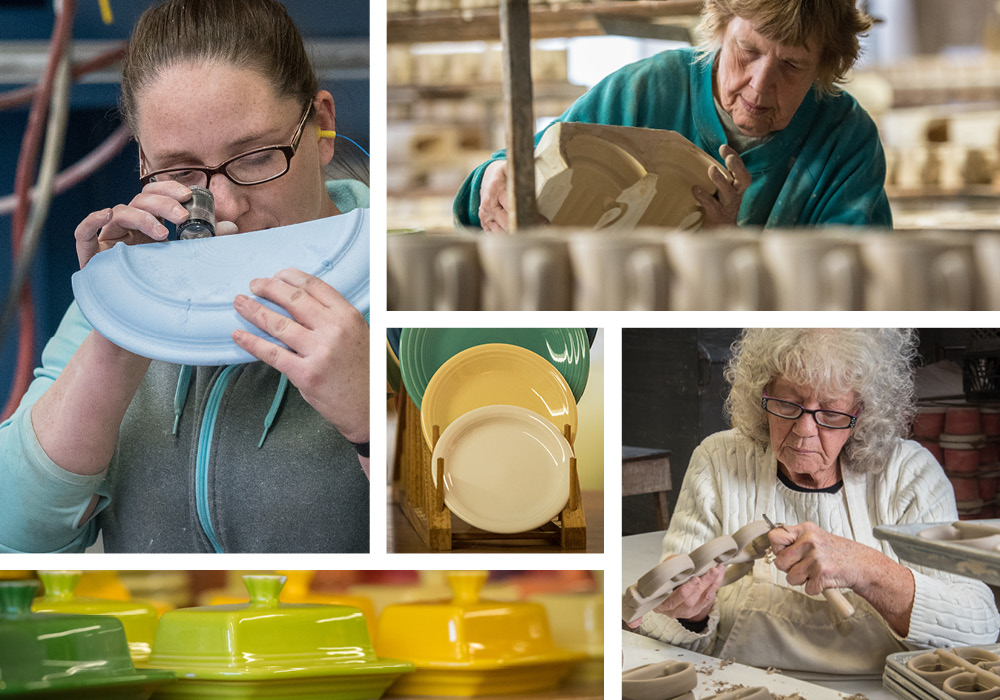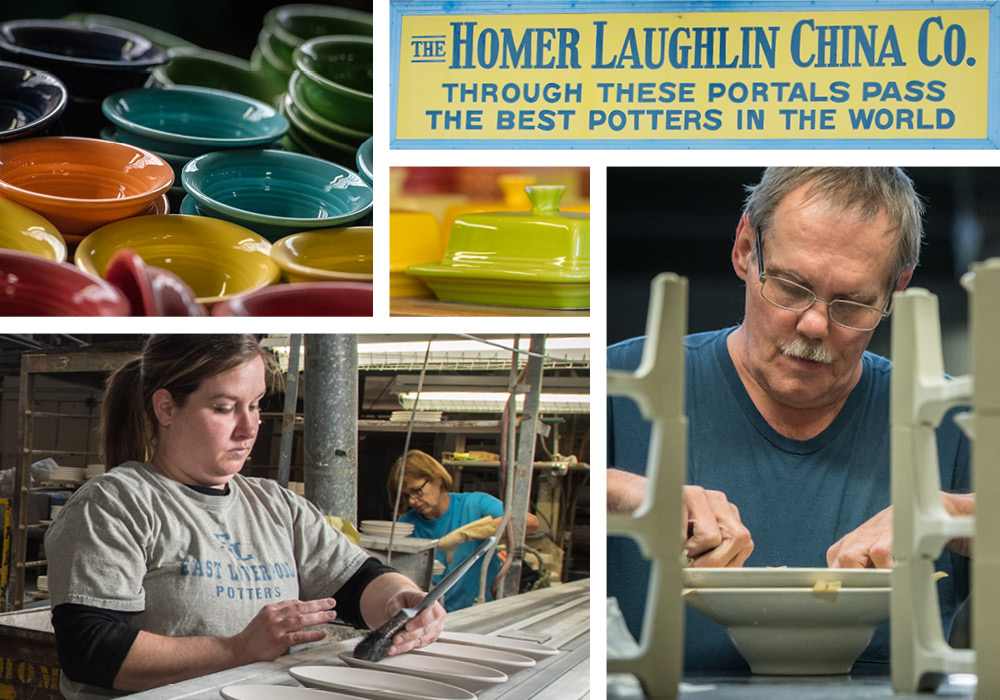Local 419M Members Create Classic, Colorful China
The more than 500 USW members who work at the Homer Laughlin China Co. factory take great pride in the fact that they spend their days producing some of the best-known tableware on the planet.
The company, located in Newell, W. Va., produces Fiestaware, the collectible mix and match dinnerware prized for its brilliantly colored glazes, along with other high quality china found in the best hotels, restaurants and dining rooms.
“If you buy Fiestaware or china from Homer Laughlin China Co., you’re not only buying the finest quality ware, you’re also supporting quality people and good manufacturing jobs,” said Local 419M President Tom Hubbard.
Those good jobs have in turn supported the families and community in and around Newell for nearly 150 years. Founded as Laughlin Pottery in 1871 in nearby East Liverpool, Ohio, the company opened its West Virginia facility in 1903. Today, that site includes two nearly identical facilities that cover 37.5 acres.
FIESTAWARE IS BORN
In 1936, Homer Laughlin gave birth to a classic piece of Americana when the company introduced its Fiesta brand of tableware, a line of vibrantly colored products that today are produced in 14 unique hues, including the popular mulberry line introduced in 2018.
The line also has included 36 other limited-edition or discontinued shades, which have helped to make Fiestaware not just a vital part of American dinner tables, but also a prized collectors’ item.
In fact, the brand has a group of dedicated fans, known as the Homer Laughlin China Collectors Association, a non-profit organization that includes more than 1,000 dues-paying members, produces a quarterly magazine and hosts an annual conference for members every summer.
That level of customer devotion is not lost on the USW members at Homer Laughlin, many of whom take an equal measure of pride in their handiwork. The company is proud of its workers, too. A sign on an outside wall declares: “Through these portals pass the best potters in the world.”
“They want this stuff to be perfect,” Hubbard said of the USW members who work at the factory.
Devotees of Homer Laughlin products, including members of Local 419M, are known to each other as “plate flippers” for their habit of turning hotel and restaurant china over to find out where it was made. Homer Laughlin products are stamped on the bottom.
“You flip a cup to see where it’s made, or flip a plate to see if it’s made here,” said 34-year member Brenda Kraft.
It’s important to check, because imported dinnerware often does not adhere to the same standards, for factors such as lead content, as the ware produced in Newell, said Marilyn Boyd, a 37-year employee who spends her days painting gold designs onto pieces of high-end dinnerware.
“If somebody serves me dinner in a restaurant and I get an imported plate and it has a chip in it, I’ll send it back. I won’t eat on it,” said Boyd. “It doesn’t matter where I go to eat – I have to see where the ware is from.”
QUALITY CONTROL
The iconic status of Homer Laughlin products means that quality control is a high priority for the members of Local 419M. No piece of china leaves the factory without being inspected several times over by members of the union.
“Quality control– they’re really the backbone of the operation,” Hubbard said.
Chuck McIntire, who produces handles for Fiesta pieces such as teapots and coffee mugs, works hard to make sure every piece of ware that leaves his shop is flawless.
While McIntire makes an average of about 1,200 handles per day, he said there have been days when he’s made twice that many.
Despite the hard days, the presence of the USW at the factory makes the jobs at Homer Laughlin worth keeping, he said.
“You have good days and bad days, but it’s a really good job,” McIntire said.
IT ALL STARTS HERE
Brandon Adams’ job places him at the very beginning of the production process, where he mixes clay and loads finished chunks of the material onto carts. The slabs are then separated into small pieces that are crafted into some of the more than 140,000 items the facility turns out each day.
“This is where it all starts, right here,” he said.
On its website, the company estimates that it has made more than 25,000 unique products over the years.
Other than the raw materials used to make clay, the workers at Homer Laughlin create nearly everything they need to produce all of its products, from mixing the dyes used for each unique color, to making their own molds and hand tools, to printing customized decals in a small shop inside the factory.
Lori Barrett is one of the curators of the dozens of decals that have adorned Homer Laughlin products over the years. In case of replacement orders, Barrett keeps meticulous track of the numbered designs, down to the very first one ever made. During a recent shift, Barrett dug out design No. 1, a simple double-circle decal that decorated the outer rim of a plate.
Other designs are far more ornate, such as those that have adorned plates at the historic Café du Monde in the French Quarter of New Orleans, one of the many well-known restaurants for which Homer Laughlin has produced china.

LONG HISTORY
Like its products, the work force at the Homer Laughlin factory has a long history. A majority of the workers have been on the job for several decades.
Edna Pitcock is one of the longesttenured workers, having been at the factory for 46 years.
Pitcock said that through the years she’s seen countless changes at the plant – from the work environment to materials, product lines and production methods – but has always looked forward to spending her days at the factory.
“I’ve never minded the job,” Pitcock said. “It’s fulfilling work.”
One major change Pitcock noted has been increased automation, which has slowly eroded the USW membership from a peak of about 900 to just over 500 today.
Still, automation is not the biggest challenge facing workers at the Newell plant. An even bigger threat, members say, is competition from unfairly traded and inferior overseas imports.
“Orders haven’t been what they used to be,” Hubbard said, citing attempts by competitors from China and elsewhere to “knock-off” the look and feel of Fiestaware.
“That’s what we’re up against right now,” Hubbard said, noting that while some competitors’ products might look like Fiestaware, the quality of the products at Homer Laughlin is difficult to match.
“You have to touch it to know the quality of what you’re getting,” Hubbard said, noting that customers often purchase china online without getting a chance to examine it, then are disappointed to find that they got what they paid for, a low-quality piece of tableware.
At the Newell factory, customers not only have the opportunity to see, touch and purchase china at the Homer Laughlin outlet store, they can tour the factory and also visit an on-site museum devoted to the company’s rich product history.
UNION PROVIDES STABILITY
“Pottery has always been here,” said Shelba Kirkbride, a 42-year employee who also serves as Local 419M secretary.
The Newell area at one time was home to more than a half-dozen pottery companies, she said. Today, Homer Laughlin is the only one left in the region and one of the few remaining in the United States.
Local 419M was part of the Glass, Molders, Pottery, Plastics and Allied Workers International Union (GMP) before the GMP merged with the USW in September 2016.
The union has worked hard over the years to keep the factory running efficiently and safely, Kirkbride said.
“The union makes this a stable job,” she said. “And the union is about the only leverage we have to get things done.”
Still, working for a company like Homer Laughlin isn’t for everyone, Hubbard admitted, noting that the job requires a high level of skill, precision and concentration.
“This is challenging work,” said 42-year employee Kevin Manypenny as he painted decorative lines on saucers by hand. “We want our products to be of good quality, products that people want.”
Hubbard said that members of Local 419M will keep working as hard as they can toward that goal, to ensure that the factory remains a source of good jobs and quality products for generations to come.
“Pottery is no fun for people who don’t want to work, but this is a hardworking bunch,” Hubbard said. “We want to keep the doors open.”
Taking pride in their hard work will be what continues to sustain the members of Local 419M, he said.
“We preach that every day,” Hubbard said. “That’s what’s going to keep us in business - the pride in our ware.”


